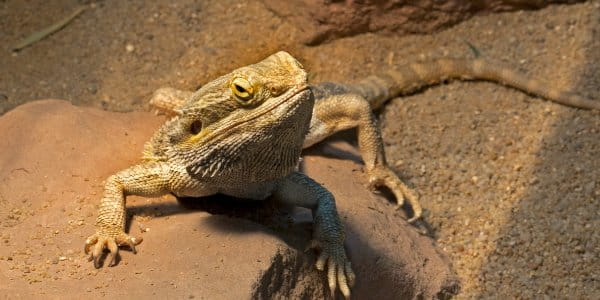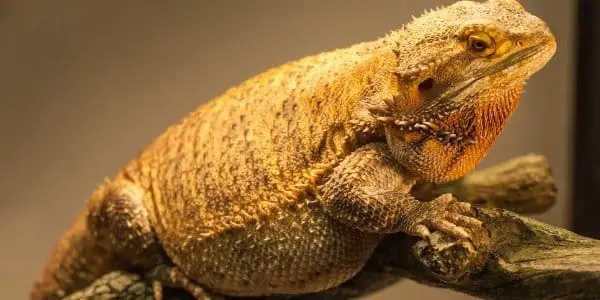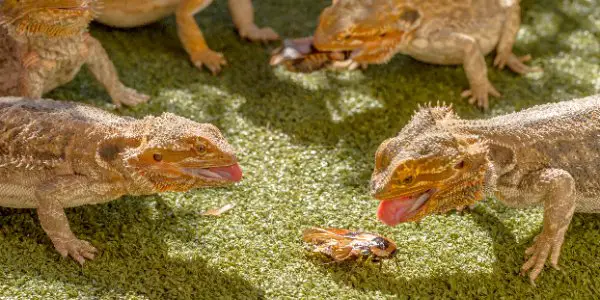Bearded dragons are a very common household pet, but there’s also a lot of misinformation about properly caring for your bearded dragon on the internet. Dragons tend to eat a lot, and it might make you wonder at what point your dragon has overeaten.
Yes, you can overfeed a bearded dragon, though most adults will stop eating when full. However, signs that your bearded dragon has eaten too much are lethargy, bloating, constipation, and difficulty moving. If you notice these signs, you should contact your veterinarian immediately.
In the rest of this article, I’ll go over essential topics related to overfeeding your bearded dragon, such as knowing if overfeeding has occurred, what you should do if it happens, and whether your beardie will stop eating when it’s full and more. So if you’d like to learn more about avoiding overfeeding, be sure to stick around.
How To Know if You Have Overfed Your Bearded Dragon?
It’s funny that these creatures somehow survive in the wild yet seem so fragile and sometimes obtuse when eating in captivity. Often bearded dragons can be challenging to feed greens, but they absolutely need them to survive.
Yet somehow, they’re always down to chow on some bugs. They almost seem to behave like a naughty toddler at dinner time.
So how exactly can you tell if you’ve overfed your bearded dragon? Well, as I previously stated, there are a few ways to tell, such as:
- They’re behaving lethargically.
- Their abdomen appears bloated.
- They haven’t pooped in some time.
- They seem to be having difficulty moving the lower half of their body.
- They’ve eaten upwards of 10 crickets or other giant bugs in one sitting.
If you notice any of these signs in your baby bearded dragon, you should call to set up an appointment with your veterinarian immediately. If left untreated, these symptoms are incredibly uncomfortable and can even cause death in your beardie. It’s always better to be safe than sorry when dealing with a reptile’s health.
You can easily avoid overfeeding by creating a proper feeding schedule for your lizard, ensuring plenty of greens to eat, a warm heating lamp, and lots of water.
What To Do if You Have Overfed Your Bearded Dragon?
If you think you’ve overfed your bearded dragon, there are a few things that you should consider doing to help your little dragon friend. Though overfeeding isn’t a regular occurrence in bearded dragons, when fed a proper diet, you should take it very seriously.
What steps you should take if you’ve overfed your beardie:
- Call your local veterinarian and ask for their advice. There’s a good chance they’ll want to see your lizard, but they may also be able to give you some helpful advice on alleviating your dragon’s symptoms, such as constipation, over the phone.
- Let your bearded dragon soak in some water. Soaking for 15-20 minutes is a great way to help hydrate your lizard so that it can digest its food and poop. Remember that water temperature does matter, and the water should be about 85-92°F (29-33°C) for your bearded dragon to be comfortable.
- Have your lizard relax under their heat lamp. Bearded dragons bask under a heat lamp to properly digest their food. If you suspect your beardie has overeaten, warming them up will help them pass the food more efficiently. You should keep your lizard’s basking spot at about 88-100°F (31-38°C) during the daytime.
Your bearded dragon will be okay so long as the more extreme symptoms such as difficulty moving their lower body haven’t set in yet. However, you must get them some help, or their condition can quickly progress to a dangerous level. When in doubt, always consult a veterinarian about your lizard’s condition.

Do Bearded Dragons Stop Eating When Full?
There are undoubtedly well-behaved bearded dragons out there who eat just the right amount of food without issue. However, each lizard will be vastly different, and the age of your beardie can drastically affect how much self-control they have. So it’s always important to monitor how much food your bearded dragon consumes each day.
Adult bearded dragons will generally stop eating when they’re full; however, juvenile bearded dragons seem to overeat more. Hence you should introduce food multiple times per day and remove it after about 10-15 minutes. This process prevents overeating or your dragon from eating spoiled food.
Setting up a feeding routine for your bearded dragon can help your scaly friend better control the amount of food they take into their bodies. These creatures’ natural instinct is to eat as much as possible at one time to avoid scarcity of food in the wild.
This behavior is why most people recommend feeding your bearded dragons a few times a day and removing any uneaten food after 10-15 minutes. By removing uneaten crickets and greens, your dragon will better understand that it’s feeding time and that they should eat when you present their food.
Frequent overeating can be a significant health concern for your beardie in the long run. So if your lizard doesn’t get ill from frequent overfeeding, it’ll undoubtedly gain weight, which can cause your bearded dragon to become obese. Obesity in bearded dragons can cause many health problems, and you should avoid it at all costs.
If you regularly overfeed your Beardie, you may notice:
- Thickening of the tail
- Enlargement of the fat pad on the head
- Fat pockets behind your bearded dragon’s arms
- An enlarged stomach that drags on the ground
- The appearance of jowls.
The above are all signs of obesity in a bearded dragon, a condition that may cause illness or even death. You should take immediate steps to reduce your Beardie’s food intake.
How Much Should a Bearded Dragon Eat?
Bearded dragons are fantastic lizards, and they can be fun to feed since they love to consume various plants and bugs. However, it can be tricky to get their diet just right since they require such a diverse amount of nutrition.
An adult bearded dragon should eat about 7-10 crickets or 3-4 Dubia roaches per day and a fresh salad. How much your dragon eats is highly dependent on its age and size. However, all dragons will need protein from bugs and vitamins from green veggies each day.
It’s also essential that you remove leftover food and bugs at the end of the day. For example, leftover lettuce and veggies can quickly spoil in your beardies warm tank and collect harmful bacteria. Should your lizard consume spoiled food, it may make them feel unwell.

What Should You Feed Your Bearded Dragon?
A bearded dragon’s diet primarily consists of different bugs and greens. However, your dragon needs several types of veggies and bugs in their diet to remain happy and healthy.
A few foods you should consider adding to your bearded dragon’s diet:
- Earthworms
- Mealworms (if the dragon is an adult)
- Squash
- Alfalfa
- Bok choy
- Carrots
- Celery
- Collard greens
- Dandelion greens
- Mustard greens
Bearded dragons are also able to consume a small variety of fruits in extreme moderation, such as:
- Apples
- Bananas
- Blueberries
- Cherries
- Blackberries
- Raspberries
- Peaches
- Strawberries
However, you should always be extremely cautious when giving your beardie fruit and only in small quantities. Here is a full guide about feeding baby bearded dragons + bearded dragon feeding charts.
When feeding your bearded dragon, they must get a healthy mix of greens, protein, and calcium. I personally recommend Fluker’s Calcium Reptile Supplement (available on Amazon.com). This calcium also comes with added vitamin D3, plus it’s been finely ground so that you can dust your lizard’s food with it.
Frequently Asked Questions
How Many Times a Day Do You Feed a Bearded Dragon?
You should feed a bearded dragon 2-3 times per day on average. However, for an older bearded dragon, you can often get away with feeding once per day and removing any leftover food at the end of the day. It’s essential to remove uneaten food, as it can rot and make your dragon sick later.
Can Bearded Dragons Go a Day Without Eating?
Bearded dragons can go a day without eating, and many often do. Bearded dragons are known for going long periods without food in the wild. However, domestic beardies prefer regular meals each day to be healthy and happy.
How Much Should a Juvenile Bearded Dragon Eat?
Juvenile bearded dragons can eat up to 50 insects a day.

Conclusion
You can undoubtedly overfeed a bearded dragon. Bearded dragons’ natural instincts make them too willing to keep eating when they’re full for fear of not knowing when their next meal will be.
Its important as bearded dragon owner to learn about baby bearded dragon’s diet and how much food they eat should.
Overfeeding a lizard can lead to several health problems down the road if left unchecked, some of which include:
- Obesity
- Lethargy
- Bloating
- Constipation
- Difficulty moving
If you notice that your lizard is struggling with any of the above-listed symptoms, it’s a good idea to consult a veterinarian immediately. Many of these symptoms can be life-threatening for your lizard.